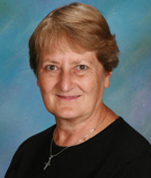Embracing Christ, recognized or disguised, in his worldwide family

Sister Rachel Bergschneider, OSB
By Sister Rachel Bergschneider, OSB
Solemnity of the Most Holy Body and Blood of Christ (Corpus Christi)/June 18
Deuteronomy 8:2-3,14b-16a; Psalm 147:12-13,14-15,19-20; 1 Corinthians 10:16-17; Sequence: Lauda Sion; John 6:51-58
The Church has had a beautiful continuum of celebrations these last few weeks — Ascension, Pentecost, Holy Trinity, and Corpus Christi. Each has a story about our faith that grounds us in the magnificence of God’s gracious love for us.
Today’s feast, the Solemnity of Corpus Christi, the Body and Blood of Christ, is a highlight for me. The Eucharist, so central to our spiritual life, has been celebrated culturally in diverse rituals, each one signaling a deep respect for the meaning of the Eucharist throughout history.
St. Paul, in his second letter to the Corinthians, first captured the meaning of the Eucharist in his description of the institution of the Eucharist, and then in his rather lengthy description of the people of God as the Body of Christ. All together we, the People of God, manifest Christ to the world. All together we work to build up the kingdom of God that Jesus so ardently struggled to teach us. This profound mystery of our connectedness and our responsibility to make the meaning of the Eucharist real by doing what Jesus did — dying to our selfishness and sin and rising to new life in Christ — is the focus of our Eucharistic celebration every day. “Do this in memory of me” are words of Jesus that take us out of ourselves and demand that we do what Jesus did for the sake of others.
In the Middle Ages, the feast of Corpus Christi, for historical reasons, focused on the real presence of Christ in the Eucharist. To emphasize this, elaborate processions took shape, with different cultures putting their own mark on the feast’s ritual. Because the spirituality of the time emphasized adoration of the real presence of Jesus, the emphasis on the Body of Christ was less highlighted.
ROOM FOR BOTH
The real genius of the Church’s tradition is that it holds both to be important. The feast of Corpus Christi challenges us to balance these two meanings of the Eucharist in our own spiritual life.
Having the Eucharist just for myself belies the very reason Jesus died and left the Eucharist as His memorial. At the same time, the necessity of developing a life of prayer centered on the real presence of Christ in the Eucharist will give us the courage to give selflessly of ourselves to meet the vast Body of Christ, the people of God, the worldwide Corpus Christi each day of our lives. It will give us the eyes to meet the homeless without shelter, the child without stability, the lonely elderly, the successful graduate, the newly married — every person who asks us to respect the disguised Christ before us.
A story recounted by Jim Wallis in his book “Who Speaks for God?” makes the point:
“A reporter was covering the conflict in the middle of Sarajevo, and he saw a little girl shot by a sniper. The reporter threw down his pad and pencil, and stopped being a reporter for a few minutes. He rushed to a man who had picked up the child, and helped them both into his car.
“As the reporter stepped on the accelerator, racing to the hospital, the man holding the bleeding child said, ‘Hurry, my child is still alive.’ A moment or two later, ‘Hurry, my friend, my child is still breathing.’ A moment later, ‘Hurry, my friend, my child is still warm.’ Finally, ‘Hurry, oh, God, my child is getting cold.’
“When they got to the hospital, the little girl was dead. As the two men were in the lavatory, washing the blood off their hands and their clothes, the man turned to the reporter and said, ‘This is a terrible task for me. I must go tell her father that his child is dead. He will be heartbroken.’
“The reporter was amazed. He looked at the grieving man and said, ‘I thought she was your child.’ The man looked back and said, ‘No, but aren’t they all our children?’”
Yes, they are all our children. They are God’s children, and He has entrusted us with their care, whether it be in Sarajevo, in Chicago, in Paris, or in Peoria.
—
Sister Rachel Bergschneider, OSB, is a member of the Sisters of St. Benedict of St. Mary Monastery in Rock Island. She serves as pastoral associate at St. Thomas the Apostle Parish in Peoria Heights.





